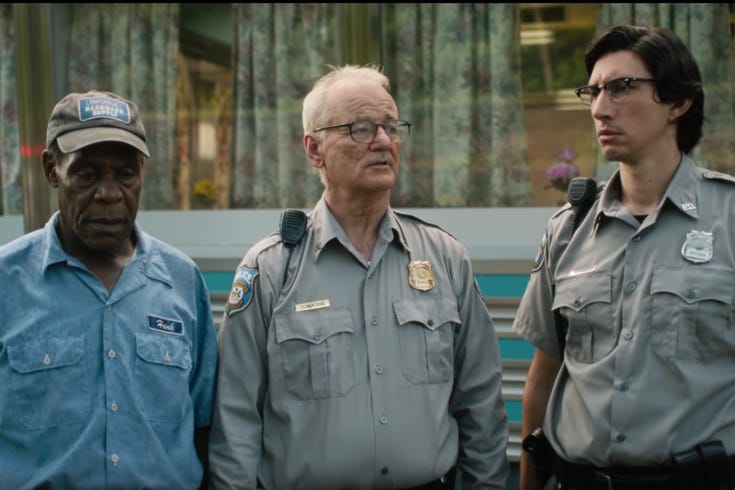The Dead Don't Die

A couple years past the heights of the zombie movie craze, Jim Jarmusch's The Dead Don't Die seems to be an attempt to reanimate the genre through satire, genre-bending, social commentary, and self-awareness. I emphasize "attempt," because while all of those elements are present, they don't all work together to make The Dead Don't Die a satisfying piece of entertainment.
The Dead Don't Die settles in on the small, lazy New England town of Centerville, population: 738. The story is primarily focused on two local police officers, Ronnie and Cliff (Adam Driver and Bill Murray), as they make their way through town discovering the zombie outbreak. Their arc is interspersed with vignettes of other citizens of Centerville, as well as visitors passing through during the disaster. Ronnie and Cliff are notably nonchalant in their reaction, though Murray's and Driver's performances give the impression that perhaps this is just how they respond to everything: brow furrowed and lips pursed with slightly perturbed confusion.
Other characters seem to react a little more naturally to the outbreak; Chloë Sevigny plays another, greener cop who cries and blubbers as Centerville falls apart around her. Danny Glover's Hank, the hardware store owner, is disturbed and dismayed by the events that play out, though even he carries an air of geriatric resignation—I suppose that's the Roger Murtaugh in him. Steve Buscemi parodies the bigoted rural conservative as Farmer Frank; Tilda Swinton slices zombie heads as an eccentric, katana-wielding funeral home director; and Selena Gomez briefly pops in with some friends as "Cleveland hipsters" traveling through town. The whole story is framed through the omniscient lens of a local hermit named Bob, played by Tom Waits. Waits' narration and observation gives the film somewhat of an old-timey storybook atmosphere, perhaps the film's only attempt at earnest charm.
Jarmusch's approach to storytelling here is an insouciant one; characters are more apt to shrug, sigh, or raise an eyebrow at the appearance of the undead than to scream or run. In some ways, this gives the film a deadpan humor that works for the occasional nasal-exhale laugh—or, in one case, a solid belly-laugh, thanks to Driver's always-perfect delivery. Unfortunately, the majority of the film feels almost weighed down by this sleepy pessimism hanging over it. I couldn't seem to get a grasp on what Jarmusch was going for here—there are tiny morsels of political commentary that don't really seem to dig any deeper than buzzwords, but the zombie outbreak itself doesn't really seem to symbolize much, or at least not any one thing consistently. The film's dour tone and sauntering pace make for welcome amusement for about the first 30 minutes, but when things never pick up, not much happens, and characters don't seem to change, learn, or accomplish much, the sardonic cynicism becomes grating.
Driver comes out of it looking the best, thanks to his command over simple dialogue and a comic meta-awareness that Jarmusch gave his character. Murray feels like he's tired of playing someone who's tired; he practically seems to overstate his understatement in some moments. Sevigny feels totally wasted, being relegated to the caricaturized crier and complainer—which, to be fair, is more likely how I or anyone else would respond to the undead apocalypse in reality, but juxtaposed against Jarmusch's nonchalant story, makes her seem pathetic and useless. The rest of the cast pretty much shine in their small, typecast roles, but aren't given a whole lot to do.
A smattering of effective running gags, some fun offbeat performances, and a vague uniqueness of tone are about all The Dead Don't Die has to offer. Jarmusch's abrasive pessimism in his reflection of people becomes very tiring over the short but slow running time, and too much of the cast isn't given enough to work with. It's the kind of film that feels like it's trying really hard to say a lot of things, but mumbles its way through like a drunk, delirious vagabond on a street corner. I can't tell what Jarmusch wanted me to get out of it, and regardless, I didn't get much anyway. If you see it, see it for Driver and Swinton, and maybe have something else to do while you watch.



